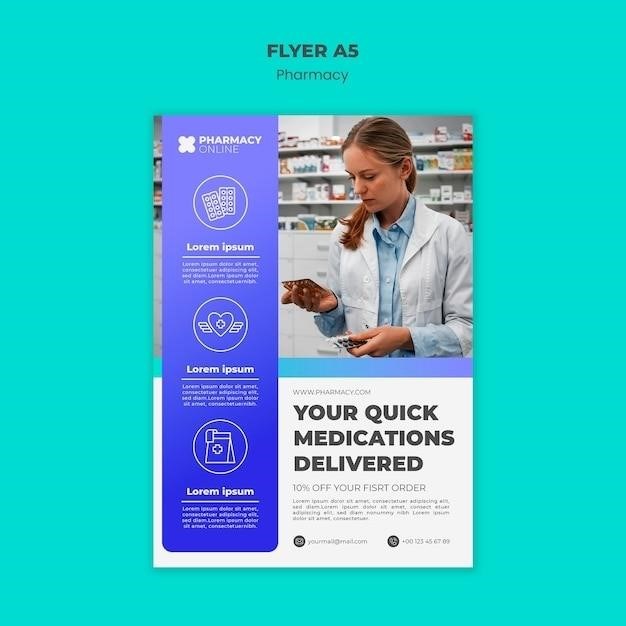
The Pharmacy Technician 7th Edition PDF⁚ A Comprehensive Guide
This guide explores the 7th edition of “The Pharmacy Technician,” a valuable resource for students and professionals. We examine its key features, content, and accessibility, including legal and ethical considerations regarding PDF access. Discover alternative acquisition methods and supplementary learning resources.
Overview of “The Pharmacy Technician, 7th Edition”
The Pharmacy Technician, 7th Edition, stands as a cornerstone text for aspiring and practicing pharmacy technicians. Authored by Perspective Press and endorsed by the prestigious American Pharmacists Association (APhA), this comprehensive resource provides a practical and accessible approach to mastering the core principles and skills necessary for success in this dynamic field. The book’s applied focus ensures that students gain not just theoretical knowledge but also the practical application skills required in real-world pharmacy settings. It serves as a valuable tool for preparing for crucial certification exams such as the Pharmacy Technician Certification Exam (PTCE) and the Exam for Certification of Pharmacy Technicians (ExCPT). The 7th edition likely incorporates updated information on current pharmacy practices, medication advancements, and relevant legal and regulatory changes, ensuring students receive the most up-to-date training possible. Its clear and concise writing style, combined with practical examples and exercises, makes complex concepts easy to understand and retain. The book’s accessibility makes it a suitable learning tool for diverse learners, catering to various learning styles and skill levels. The text’s wide adoption by educational institutions further solidifies its reputation as a reliable and effective learning resource.
Key Features and Benefits of the Textbook
The 7th edition of “The Pharmacy Technician” boasts several key features designed to enhance learning and exam preparation. Its clear and concise writing style ensures easy comprehension of complex pharmaceutical concepts. The inclusion of practical, real-world examples helps students apply theoretical knowledge to practical scenarios encountered in pharmacy settings. The text likely incorporates numerous illustrations, diagrams, and tables to aid visual learning and retention of key information. Furthermore, the book’s structure and organization likely promote a logical and sequential understanding of the material, making it easier for students to follow the progression of topics. The integration of practice questions and review exercises allows students to assess their understanding and identify areas needing further study. Endorsement by the American Pharmacists Association (APhA) lends credibility and assures readers of the text’s accuracy and relevance to current industry standards. The book’s accessibility and applied approach cater to diverse learning styles and skill levels, maximizing its effectiveness for a wide range of students. Finally, its alignment with the content of national certification exams like the PTCE and ExCPT directly benefits students preparing for these crucial assessments, increasing their chances of success.
Content Covered in the 7th Edition
While the exact table of contents isn’t provided in the source material, based on the descriptions, the 7th edition of “The Pharmacy Technician” likely covers a comprehensive range of topics essential for pharmacy technician training. This probably includes fundamental pharmaceutical principles, medication calculations and dosage forms, medication safety and error prevention, legal and ethical considerations in pharmacy practice, inventory management and control, sterile compounding techniques, and patient counseling skills. The text likely delves into various aspects of pharmacy operations, such as prescription processing, dispensing medications, handling controlled substances, and interacting with patients and healthcare professionals. Specific chapters might be dedicated to different drug classes, their therapeutic uses, side effects, and potential interactions. Additionally, the book likely integrates information on healthcare technology, such as electronic health records and pharmacy management systems, reflecting the increasing digitalization of the healthcare industry. The curriculum likely emphasizes the importance of professionalism, teamwork, and communication skills, crucial for success in a pharmacy setting. The depth and breadth of content aim to equip students with the necessary knowledge and practical skills for a successful career as a pharmacy technician.
Endorsements and Authoritative Sources
The provided text highlights the endorsement of the American Pharmacists Association (APhA), a significant credential lending credibility and authority to “The Pharmacy Technician, 7th Edition.” This endorsement suggests the textbook aligns with industry standards and best practices, making it a reliable resource for aspiring pharmacy technicians. The APhA’s recognition implies the content has been reviewed and deemed suitable for preparing students for certification exams and professional practice. While specific authors aren’t explicitly named in all excerpts, the consistent mention of publishers and the APhA’s support strongly suggests a rigorous development process involving pharmacy experts and educators. The book’s alignment with national certification exams (PTCE and ExCPT) further underscores its authority, indicating its curriculum directly addresses the knowledge and skills assessed in these crucial professional licensing tests. This combination of APhA endorsement and exam alignment positions the textbook as a trusted and authoritative learning tool within the pharmacy technician field.
National Certification Exam Preparation
The Pharmacy Technician, 7th Edition, is explicitly designed to aid students in preparing for the Pharmacy Technician Certification Exam (PTCE) and the Exam for Certification of Pharmacy Technicians (ExCPT). The text’s content directly addresses the knowledge and skills assessed in these crucial exams. This targeted approach ensures students gain a comprehensive understanding of the material needed to succeed. The book’s structure likely incorporates practice questions, case studies, or other assessment tools mirroring the exam format, providing valuable experience for test-takers. This focus on exam preparation differentiates it from other textbooks that may cover broader pharmacy-related topics without this specific certification-focused approach. By aligning its content with the PTCE and ExCPT, the textbook increases the likelihood of exam success, providing students with the confidence and knowledge they need to begin their careers as certified pharmacy technicians. This direct correlation between textbook content and exam requirements is a key advantage for those seeking certification. The text likely offers strategies and techniques for effective exam preparation beyond simply covering the subject matter, offering a complete preparation package.
Accessing the PDF⁚ Legal and Ethical Considerations
Accessing a PDF of “The Pharmacy Technician, 7th Edition,” requires careful consideration of copyright laws and ethical implications. Downloading or sharing copyrighted material without permission is illegal and could result in penalties. Legitimate access typically involves purchasing the textbook directly from the publisher, a reputable online bookstore, or through a library. Exploring options like renting or purchasing used textbooks can also provide cost-effective alternatives to acquiring a new copy. Free PDFs found online may be pirated versions, violating copyright and potentially containing malware or inaccuracies. Ethical considerations extend to respecting intellectual property rights and supporting authors and publishers. Using unauthorized PDFs undermines the educational system and could impede future textbook development. Students should prioritize legal and ethical acquisition methods to ensure access to accurate and reliable learning materials while acting with integrity. Remember, respecting copyright protects creators and ensures the continued availability of educational resources.
Alternative Methods to Obtain the Textbook
Beyond purchasing a new hard copy or digital version, several alternatives exist for acquiring “The Pharmacy Technician, 7th Edition.” Consider renting the textbook for a semester or academic year; many online platforms offer this service at a significantly reduced cost compared to purchasing. Used textbooks are another viable option, often available at discounted prices from online marketplaces or college bookstores. Check your college library; they may have a copy available for in-library use or loan. Exploring options like digital library subscriptions is also worth considering. Some institutions offer access to extensive e-book collections, potentially including this title. If your institution utilizes a specific learning management system (LMS), check if the textbook is accessible through that platform. Finally, inquire with your instructor about potential alternative resources, such as recommended supplementary materials or online modules covering similar content. Remember to always check the edition and ensure it aligns with the course requirements before committing to any alternative method.
Utilizing Online Resources for Pharmacy Technician Training
The digital age offers a wealth of online resources to supplement your learning alongside “The Pharmacy Technician, 7th Edition.” Numerous websites provide free or paid practice exams mirroring the PTCE and ExCPT, crucial for national certification. Interactive quizzes and flashcards can reinforce key concepts covered in the textbook. Video lectures and tutorials on various pharmacy-related topics are readily available on platforms like YouTube and educational websites. Online communities and forums dedicated to pharmacy technicians offer peer support, allowing you to connect with other students and professionals for assistance with challenging material. Many professional organizations, such as the American Pharmacists Association (APhA), provide online resources, including articles, webinars, and continuing education opportunities. Remember to critically evaluate the credibility of online sources and prioritize information from reputable organizations and educational institutions. Supplementing your textbook study with these diverse online resources can significantly enhance your understanding and preparation for the pharmacy technician certification exams.
Comparison with Other Pharmacy Technician Textbooks
While “The Pharmacy Technician, 7th Edition” enjoys APhA endorsement, a comparative analysis against competing textbooks is crucial for informed decision-making. Consider factors such as the textbook’s writing style – clarity, accessibility, and engagement – to determine its suitability for your learning style. Evaluate the comprehensiveness of the content, comparing the depth of coverage for key topics such as medication calculations, dispensing procedures, and legal regulations. Examine the inclusion of practice questions, case studies, and other interactive learning tools. Assess the availability of supplementary resources like online access codes or instructor guides. Pricing and format (physical versus digital) are also key considerations, as are reviews from other students and professionals. By comparing features and user feedback across different textbooks, you can identify the best resource to support your individual learning needs and goals in pursuing a pharmacy technician career. Remember to check for updates and new editions to ensure you have the most current information.
The Role of a Pharmacy Technician
Pharmacy technicians are integral members of the healthcare team, working under the supervision of licensed pharmacists. Their responsibilities encompass a wide range of tasks crucial to the efficient operation of a pharmacy. These include assisting with prescription filling, accurately measuring and dispensing medications, maintaining accurate inventory records, and handling insurance claims. Technicians also play a vital role in patient care, providing information about medications, answering patient inquiries, and ensuring medication safety. They may participate in compounding medications, preparing intravenous solutions, and managing automated dispensing systems. Strong communication, attention to detail, and adherence to strict safety protocols are essential for success in this demanding yet rewarding career. The ability to work effectively both independently and as part of a team is also crucial. Continuous professional development is necessary to stay updated on new medications, technologies, and best practices. This multifaceted role requires both technical proficiency and exceptional interpersonal skills.
Pharmacy Technician Certification and Licensing
Becoming a certified pharmacy technician involves meeting specific educational and examination requirements that vary by state. Many states require completion of an accredited pharmacy technician program, although some allow on-the-job training. National certification exams, such as the Pharmacy Technician Certification Exam (PTCE) and the Exam for the Certification of Pharmacy Technicians (ExCPT), assess candidates’ knowledge and skills. Passing these exams is often a prerequisite for licensure or registration. State licensing boards establish the rules and regulations governing pharmacy technicians’ practice within their jurisdictions. These regulations may include continuing education requirements to maintain certification and ensure competency. The specific requirements for certification and licensing can vary significantly depending on the state, so it is crucial for aspiring pharmacy technicians to check with their state’s board of pharmacy for detailed information. Maintaining current certification is essential for practicing legally and ethically. This ensures that pharmacy technicians possess the necessary skills and knowledge to provide safe and effective patient care.
Finding Affordable Textbooks
The cost of textbooks can be a significant barrier for students. Fortunately, several strategies can help mitigate expenses. Exploring used textbook markets, both online and at college bookstores, often yields significant savings. Websites like Textbooks.com and GetTextbooks.com compare prices from various vendors to help find the best deals. Renting textbooks instead of buying them is another cost-effective option, allowing access to the material without the long-term commitment. Consider purchasing digital versions or e-texts, which are typically cheaper than print editions. Many institutions offer financial aid or scholarship programs to assist students with textbook costs; inquire with your school’s financial aid office. Exploring open educational resources (OER) can provide free and openly licensed educational materials, potentially eliminating the need for a costly textbook. Libraries often have collections of textbooks that can be borrowed. Finally, consider purchasing textbooks collaboratively with classmates to share the cost. By implementing these strategies, students can significantly reduce their textbook expenses and make their education more affordable.

Additional Learning Resources
Beyond the core textbook, numerous supplementary resources enhance pharmacy technician education. Online platforms like the American Pharmacists Association (APhA) website offer valuable information, continuing education opportunities, and professional networking. Many reputable websites provide practice exams and quizzes to help students prepare for certification tests like the Pharmacy Technician Certification Exam (PTCE) and the Exam for Certification of Pharmacy Technicians (ExCPT). Consider joining online study groups or forums to connect with peers, share resources, and discuss challenging concepts. Numerous YouTube channels and educational websites offer video tutorials and lectures on pharmacy-related topics. Professional journals and publications provide insights into current trends and advancements in the field. Interactive simulations and virtual labs can offer hands-on experience in a safe and controlled environment. Remember to always verify the credibility and accuracy of online resources before using them extensively in your studies. Utilizing a diverse range of learning materials ensures a comprehensive understanding of the subject matter;



